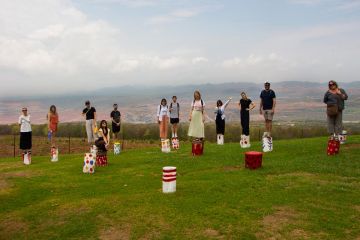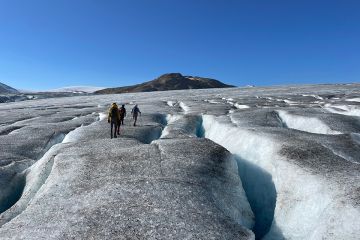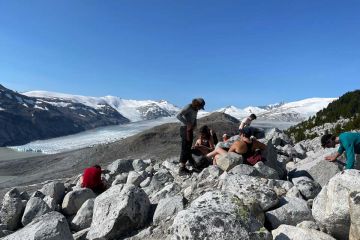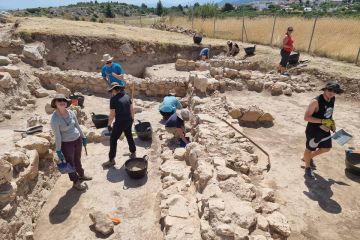Backgrounder: EU summer field school
Human and Social Development, Social Sciences, Fine Arts, Humanities, Law
The 2017 European Union summer field school includes musical performances in three European cities, as well as course itineraries in Winnipeg and Victoria.
Here are the highlights for the various locations.
EU Concerts
Three compositions, especially commissioned for the field school, will be performed in the following locations:
July 17, Central European University, 7 p.m., Budapest, Hungary
An original composition that combines voice and electronics, the inspiration for Hungarian composer Andrea Szigetvári’s piece, “Marhakaralábé Kantáta” (Beef Kohlrabi Cantata), came from a field recording made at the Keleti Railway Station in Budapest in September 2015, when hundreds of refugees were camping on a metro underpass of the Keleti train station. The train station was also the site of mass deportations of Hungarian Jews during the Second World War. The concert features soprano Márta Murányi.
July 21, Ravensbrück Memorial Site, 5 p.m., Fürstenberg/Havel
Syrian-born composer Zaid Jabri composed the piece “30 Articles for Viola and Electronics,” which will be performed by violist Ralf Ehlers from the well-known Arditti String Quartet. Ravensbrück was the largest concentration camp for women on German soil during the Second World War.
July 26, Camp des Milles Memorial Site, 8 p.m., Aix-en-Provence
UVic School of Music associate professor Dániel Péter Biró composed the piece “Gvul” (Border) for piano and electronics. Greek pianist Ermis Theodorakis will perform the music with Biró, who will focus on electronics. Camp des Milles is the site of a former French internment camp.
Canadian tour
Canadian Museum of Human Rights, Winnipeg, Aug. 17-19
The field school students will spend three days at the Canadian Museum of Human Rights, learning about Indigenous rights and title in Canada. Topics of discussion will include residential schools, reconciliation and the challenges of exhibiting mass atrocities in museums.
University of Victoria, Victoria, Aug. 20-25
The field school finishes in Victoria. Students will take part in a workshop at First Peoples House at UVic, as well as visit the Royal BC Museum and take a walking tour of PKOLS (Mount Douglas). On Aug. 21 at 8 p.m., Open Space Gallery will feature the musical compositions of Szigetvári, Jabri and Biró, which were originally performed in Europe, as part of the SALT New Music Festival and Symposium. UVic music students will present new compositions inspired by the historical sites visited during the field school.
UVic International Symposium, Victoria, Aug. 24-25
The UVic conference, Narratives of Memory, Migration, and Xenophobia: Intercultural Dialogues, will bring together scholars, students, and artists from Canada and Europe. It will examine the recent resurgence of nationalist and xenophobic movements in North America and Europe. Free and open to the public, the conference will also explore ways that post-war Europe fostered inclusion and new readings of citizenship. The findings and calls to action of the Truth and Reconciliation Commission will also be explored in discussions about past historical narratives and how they can be used to forge a path towards inclusion. The symposium includes two evening concerts, the first on Aug. 24 at 8 p.m., featuring the Quasar Saxophone Quartet with guest Joanna Hood at UVic’s Phillip T. Young Recital Hall. Then on Aug. 25, a second concert featuring the European compositions will be performed at 8 p.m. at Phillip T. Young Recital Hall, featuring the work of Szigetvári, Jabri and Biró. Students Kimberly Farris-Manning, from UVic, and Adam Scime, from the University of Toronto, will each debut a piece based on their experiences in the EU field school. Both pieces will be performed by fellow UVic student and participant, Emily MacCallum.
In this story
Keywords: field schools, music, history, interdisciplinary, racism, religion, study abroad, war, world cultures, international, student life, research, community, Holocaust, Europe
People: Charlotte Schallie, Daniel Biro, Helga Hallgrimsdottir




